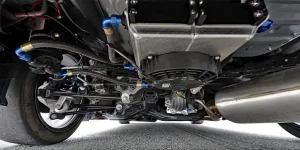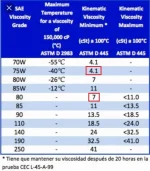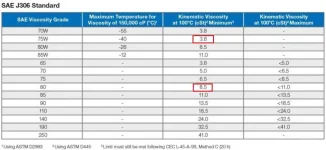I was wondering, can thicker oil protect gears better? Is a gearbox comparable to an engine where higher HTHS usually means better protection? Because it runs cooler than an engine, i am aware that the oil will be far thicker but for example there are 75w and 75w80 fluids with the MB235.10 approval and i use a 75w. Just like an engine, would switching to a heavier oil as some point such as a 75w80 be something to consider to reduce wear/noise as the gearbox gets older and clearances and plays get bigger as the gearbox ages?
You are using an out of date browser. It may not display this or other websites correctly.
You should upgrade or use an alternative browser.
You should upgrade or use an alternative browser.
Manual transmission fluid, thicker = better protection?
- Thread starter M104
- Start date
- Status
- Not open for further replies.
M104
Thread starter
I meant far thicker in the sense that they run much cooler, even a thin 75w similar to a 0w20 will run thicker than a 20w50 in an engine if i'm not mistaken.Gear oil have different designation and are not necessarily "far thicker".
for example I think 75W90 gear oil has about the same viscosity as 10W40 motor oil.
I see what you mean. The rear differential for example will be running much cooler than engine oil and therefore relatively speaking less viscous.I meant far thicker in the sense that they run much cooler, even a thin 75w similar to a 0w20 will run thicker than a 20w50 in an engine if i'm not mistaken.
good question btw. I think gears always have to or make contact and don't get into hydrodynamic type lubrication like some engine parts. Not sure just guessing.
they don't run much cooler in high performance applications. They might even run hotter. That's a dangerous assumption.
Thermal stickers on transaxle MT have shown they can get up to 150C easily when used properly
Thermal stickers on transaxle MT have shown they can get up to 150C easily when used properly
The manual transmission in my pickup runs ATF. And it seems to hold up well to towing and foot-to-the-floor for minutes on end. The 6 speed that came in the year later trucks has a fluid cooler but still runs ATF
But the pickup has the differential separate, and that will take a big source of heat away from the transmission.
I offer the attached screenprint - that is attributed to VW some years ago, probably when most VW's had transaxles... and specifically hypoid gears / crown gears... where some scuffing occurs. I personally believe it ALSO applies, generally, to straight- or (more common) helically-cut gears, evident, say, in most front wheel drive cars for the final drive.I was wondering, can thicker oil protect gears better? Is a gearbox comparable to an engine where higher HTHS usually means better protection? Because it runs cooler than an engine, i am aware that the oil will be far thicker but for example there are 75w and 75w80 fluids with the MB235.10 approval and i use a 75w. Just like an engine, would switching to a heavier oil as some point such as a 75w80 be something to consider to reduce wear/noise as the gearbox gets older and clearances and plays get bigger as the gearbox ages?
Sometimes folks are very concerned about shift feel (and particularly when cold). In other words... synchro-action. I have said it many times on this forum (to the consternation of some, I would admit) that tolerating a bit of notchiness when cold (or, alternatively, babying the shifts when cold... shifting at 'real low roadspeeds... and generally avoiding downshifts into 2nd 'till up to operating temp) may ultimately have some merit in terms of overall transmission / transaxle life expectancy.
Having said the above, I would NEVER advocating changing away from the Mfr-specified SAE oil weight, nor would I ever advocate using GL-5 lubricant unless the Mfr specifies it! I say never go thicker than the mfr calls for because thicker oil may not adequately lubricate the "speed-gears" which freewheel on the shafting... and some transmissions / transaxles have oil-troughs and oil-funnels (which in effect pump oil along the shafting to the speed-gear locations). Thicker oil can result in inadequate lubrication!
Attachments
Last edited:
To a certain extent, yes I suppose thicker oil will provide better wear protection for some of the components such as gears and ball bearings. But as long as the gearbox is getting its regular scheduled service and not being abused, I doubt running thicker oil will meaningfully extend the service life. In fact, running thicker oil than spec'd by the manufacturer will likely cause hard shifting issues in the synchros and possibly oil starvation for some mechanisms (such as the ball detents in the reverse section of my ZF S6-40).
- Joined
- Jul 11, 2014
- Messages
- 4,117
Single 'prefix' grade doesn't give enough info. 75w covers a broad range. If its 7cst fluid, its a 75w75 now. Hoping the automakers and blenders wake up to the new grades in SAE J306.
MB fluid is a 7cst. Need to see a VOA to draw a conclusion on both OE fluid recommendations.
I have no issue going thicker or thinner based on HP changes(power mods) and weather conditions. How drastic does one want to go with viscosity? Obviously, most older Mercedes, especially diesels, don't have enough power or input shaft RPM to break a transmission.
MB 235.10 is a 7cst/35cst.... similar to DexronII/III. Get a VOA of the 235.10 fluids to see what MB was doing for wear protections.

MB fluid is a 7cst. Need to see a VOA to draw a conclusion on both OE fluid recommendations.
I have no issue going thicker or thinner based on HP changes(power mods) and weather conditions. How drastic does one want to go with viscosity? Obviously, most older Mercedes, especially diesels, don't have enough power or input shaft RPM to break a transmission.
MB 235.10 is a 7cst/35cst.... similar to DexronII/III. Get a VOA of the 235.10 fluids to see what MB was doing for wear protections.
Related to the above latest (I believe; Feb. 2019) SAE J306 spec - it appears to me that there have been three (3) such specs to date... or versions, thereof. As my car takes 75W-80 GL-4 transmission fluid, I wanted to highlight how it appears the values required for 75W-80 have changed over these three spec variants.
It appears that increasingly, the viscosity required of 75W (for the fluid) has dropped. The more curious thing is how the viscosity for the 80 wt. has bounced around.
Comments would be appreciated... Please see these three graphics (which I believe are correctly labeled as version 1, 2, and 3 of SAE J306.
My final point would be that whichever version of SAE J306 which was in use when the transmission- or transaxle at issue was designed (it seems to me) would be the values of viscosity you'd want to target in your replacement MTF. Or, more correctly, whichever of the three J306 versions was in use at the time your car was mfr'd (and your owners manual was written... and MTF qualities were stated) is the MTF you should be going after. Correct?
It appears that increasingly, the viscosity required of 75W (for the fluid) has dropped. The more curious thing is how the viscosity for the 80 wt. has bounced around.
Comments would be appreciated... Please see these three graphics (which I believe are correctly labeled as version 1, 2, and 3 of SAE J306.
My final point would be that whichever version of SAE J306 which was in use when the transmission- or transaxle at issue was designed (it seems to me) would be the values of viscosity you'd want to target in your replacement MTF. Or, more correctly, whichever of the three J306 versions was in use at the time your car was mfr'd (and your owners manual was written... and MTF qualities were stated) is the MTF you should be going after. Correct?
Attachments
M104
Thread starter
Couldn't agree more. I hate having to wack gears in rapidly when it's cold and people on the road are in a hurry and the thinner fluids seem to do a great job at making shifts effortless when cold. One thing i have noticed is that fluids with a lower -40c Brookfield viscosity tend to eliminate the issue. I think that's the reason why ATF works so well in MB gearboxes. The fluids i had the best experience with are all in the same ballpark viscosity-wise being Dexron II, IID, III, 235.10 75w. How does ATF compares to a GL4 fluid in term of protection?Sometimes folks are very concerned about shift feel (and particularly when cold). In other words... synchro-action. I have said it many times on this forum (to the consternation of some, I would admit) that tolerating a bit of notchiness when cold (or, alternatively, babying the shifts when cold... shifting at 'real low roadspeeds... and generally avoiding downshifts into 2nd 'till up to operating temp) may ultimately have some merit in terms of overall transmission / transaxle life expectancy.
I actually went the opposite direction using a 75w-85 in a transmission that calls for a 75w-90. It shifts smoother and no unusual or new noises.
- Status
- Not open for further replies.
Similar threads
- Replies
- 19
- Views
- 580
- Replies
- 21
- Views
- 4K
- Replies
- 31
- Views
- 11K
- Replies
- 11
- Views
- 1K
- Replies
- 27
- Views
- 2K





